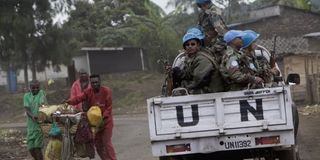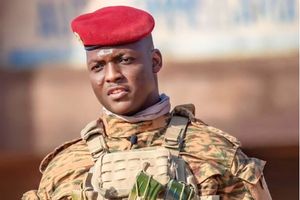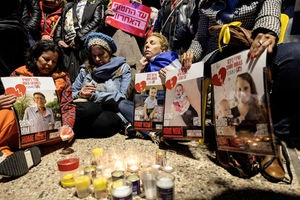UN prepares to start pulling peacekeepers from DR Congo

UN peacekeepers drive past Rutshuru residents in the eastern Democratic Republic of the Congo. PHOTO AFP via Getty Images
What you need to know:
- Despite a volatile domestic situation, the Congolese government has for months been calling for an "accelerated" withdrawal of UN peacekeepers, from the end of 2023 rather than the end of 2024. It considers the UN force to be ineffective in protecting civilians from the armed groups and militias that have plagued the eastern DRC for three decades.
United Nations. The UN Security Council is expected on Tuesday to accede to a demand from the Democratic Republic of Congo (DRC) and launch a gradual withdrawal of peacekeepers, starting later this month.
The drawdown would come despite United Nations concern about violence in the eastern part of the country.
Ravaged by conflict, the vast and impoverished DR Congo will host high-risk presidential and parliamentary elections on Wednesday, a vote that coincides with the expiry of the annual mandate of the UN peacekeeping mission, known as Monusco.
Despite a volatile domestic situation, the Congolese government has for months been calling for an "accelerated" withdrawal of UN peacekeepers, from the end of 2023 rather than the end of 2024. It considers the UN force to be ineffective in protecting civilians from the armed groups and militias that have plagued the eastern DRC for three decades.
The accusation is similar to that made by other African countries, notably Mali, which has demanded the emergency departure of the UN Minusma mission.
In recent months, several Council members, notably the United States, have expressed doubts as to whether Congolese forces are ready to replace Monusco to ensure the security of the population.
However, as UN missions cannot operate without the authorization of host countries, the DRC wants to force the Security Council's hand -- though its messaging has been less forceful than Mali's.
Even as it complies with the DR Congo's demands, the Council is expected to underline its "concern over the escalation of violence" in the east and "tensions between Rwanda and the DRC," according to a draft text seen by AFP.
If the draft resolution is adopted as expected on Tuesday, the Council will decide to "initiate the gradual, responsible and sustainable withdrawal" of the mission, in line with a withdrawal plan agreed in November between Kinshasa and Monusco.
The first phase includes the withdrawal of peacekeepers from South Kivu province by the end of April 2024, beginning "before the end of 2023."
Reduced presence
From May 2024, Monusco will be present only in North Kivu and Ituri. And from July 1, its strength will be reduced by some 2,350 personnel (from a maximum authorized strength of around 13,800 military and police personnel).
Further withdrawal will be determined on the basis of an evaluation report on the first phase, which the Council expects by the end of June 2024. A UN peacekeeping force has been present in the country since 1999. For several years, the Security Council has been cautiously disengaging, setting broad parameters for the transfer of responsibilities to Congolese forces, with an aim to begin withdrawing by 2024.
While the head of Monusco, Bintou Keita, recently expressed concern about an increased risk of "direct military confrontation" between the DRC and Rwanda, the draft resolution also calls for "calm and dialogue" between the two neighbors.
Without naming anyone, it also condemns "support by any external party" for the armed groups of the M23 (March 23 Movement) and the FDLR (Democratic Forces for the Liberation of Rwanda), and calls for the withdrawal of these external parties from Congolese territory.
In their last report, published in June, experts mandated by the Security Council claimed to have "new evidence of direct intervention by Rwandan defense forces" in the DRC, notably in support of the M23 and FDLR.
EU warning
The European Union on Tuesday warned against hate speech and violence in the Democratic Republic of Congo a day ahead of elections, amid fears that political tensions could boil over.
Forty-four million Congolese are registered to vote in Wednesday's presidential, parliamentary, provincial and municipal elections, in a country ravaged by conflict in its east.
"The EU expresses its concern about the hate speech, violence and incidents that have marked the last few days of the campaign," the EU said in a statement.
"Serious human rights violations and abuses have been recorded according to the United Nations, and it is up to the authorities to launch investigations in order to prosecute the perpetrators."
President Felix Tshisekedi, 60, stands a healthy chance of securing re-election against a divided opposition in the country roughly the size of continental western Europe.
The election campaign has taken place in relative calm, a feat in a country whose first peaceful transition of power since independence in 1960 occurred in 2018.
But Bintou Keita, the head of the United Nations peacekeeping force in the country, said Monday there had been an "escalation of violence, acts of vandalism and destruction of campaign materials as well as hate speech". In a report published on Saturday, Human Rights Watch (HRW) warned of electoral violence that "risks compromising the holding of the vote".
The NGO says it has documented clashes between supporters of rival parties since early October that have led to "assaults, sexual violence and at least one death".
The EU said in its statement that "efforts to divide the population on the basis of ethnicity or origin and any comments inciting violence are unacceptable."
The bloc recalled "the responsibility of the authorities to ensure an inclusive, free, transparent and peaceful electoral process."
Last month, the EU cancelled its deployment of election observers to DR Congo for "technical" reasons.




